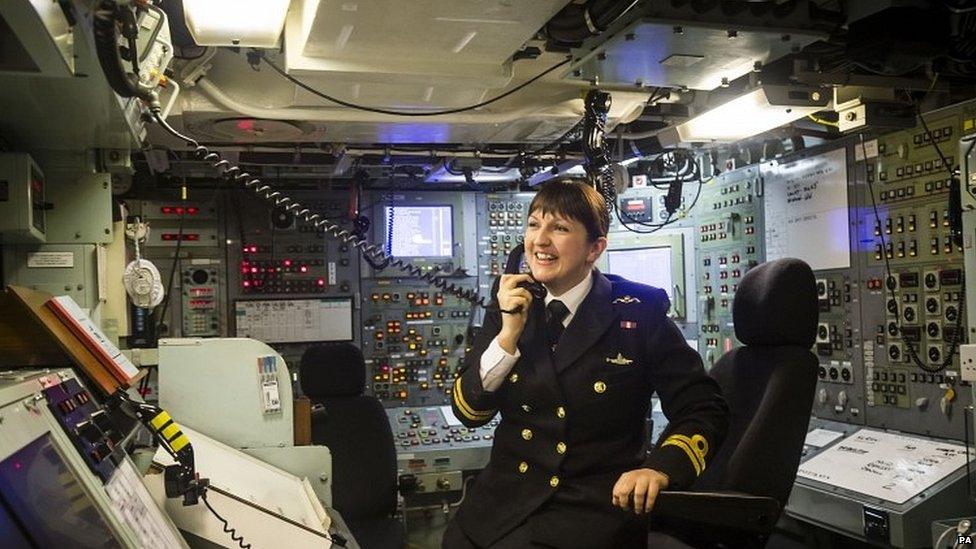Trident: Getting agreed Labour position 'may be impossible'
- Published
Shadow home secretary Andy Burnham on the issue of Trident within the Labour Party
Shadow home secretary Andy Burnham says it may be "impossible" for Labour to reach an agreed position on Trident.
Mr Burnham, who backs renewal of the UK's nuclear weapons, said a review by shadow defence secretary Emily Thornberry would be "very difficult".
Jeremy Corbyn backs unilateral nuclear disarmament and Scottish Labour has already adopted such a policy.
But Ms Thornberry has been accused of living in "la la land" amid claims the leadership might "fix" the outcome.
The shadow defence secretary received a hostile reception when she discussed the review at a meeting of Labour MPs on Monday evening. Ex-shadow defence minister Kevan Jones said Ms Thornberry had taken questions "but didn't answer any", adding that she had been "waffly and incoherent".
Some MPs told reporters outside the room that she had said Trident could soon be as obsolete as the Spitfire fighter aircraft was after the Second World War.
Shadow defence secretary Emily Thornberry on the Trident nuclear deterrant.
Ms Thornberry said she had been trying to explain that Trident may be overtaken by technology such as underwater drones, which were being developed to track submarines.
"The idea of the Trident replacement is that it can hide in the sea. If technology is moving faster than that then it may well be that Trident may not be able to hide.
"And if that's right, and if we are to bet everything on 'mutually assured destruction', we have to be assured that it will work - and if it cannot hide any more then that is a problem."
She told BBC Radio 4's Today on Tuesday that "four, five or six people kicked-off" at Monday evening's meeting of Labour MPs but they did not necessarily represent the whole Parliamentary party.
'Difficult debate'
She said she had wanted to challenge those who had said "it has to be Trident" or nothing.
Asked why she did not just admit that she was against nuclear weapons, she said it was important to discuss all options.
"We need to have all the options on the table and we need to have a proper debate within the party," she told Today.
Labour peer Admiral Lord West, a former home office minister, telephoned into the Today programme during Ms Thornberry's interview to say that her argument about underwater drones was "nonsense".
She said the Chinese, Americans and Russians would not be spending billions on research if there was nothing in it.

What is Trident for?

Since 1969, according to government documents, external, a British submarine carrying nuclear weapons has always been on patrol, gliding silently beneath the waves, somewhere in the world's oceans.
The logic is to deter a nuclear attack on the UK because, even if the nation's conventional defence capabilities were destroyed, the silent submarine would still be able to launch a catastrophic retaliatory strike on the aggressor, a concept known as mutually assured destruction.
The submarines carry up to 8 Trident missiles; each can be fitted with a number of warheads.
Read more about the history of the UK's nuclear weapons system

Mr Burnham had earlier told BBC Radio 4's Today programme: "We always knew this was going to be a difficult debate for the party - there are two positions here that are difficult to reconcile, maybe impossible to reconcile, and the party's got to find some way of accommodating those positions and move forward and not let this issue take over everything."
Defence analyst Paul Ingram, from the British American Security Information Council, said the advent of new technology meant it may no longer be possible for submarines to go undetected in 20 years.
This was a "particular problem" for the UK, he told BBC Radio 4's World at One, because it was the only nation that was "entirely dependent" on submarines for its nuclear capability.
Jeremy Corbyn is a longstanding opponent of nuclear weapons but some MPs and peers have threatened to resign if Labour reverses its decades-long support for British missiles. Others are understood to be thinking of making clear their personal support for Trident renewal to voters at the next election, if the party puts disarmament in its manifesto.
Ms Thornberry's review is due to be published in the summer but MPs could be asked to vote on whether to proceed with building successor submarines to the existing Vanguard fleet before that.
Renewing the Trident fleet, which is due to become obsolete by the end of the next decade, is estimated by the government to cost £31bn, although opponents claim the final bill will be far higher than that.
Union leaders have warned that scrapping Trident could devastate communities reliant on the defence industry. But Scottish Labour will argue against renewing Trident in May's Holyrood elections having agreed its position last autumn.
Kezia Dugdale, Scottish Labour leader, told the BBC there had been a "healthy debate" in the party in Scotland and it now had an "honest position".